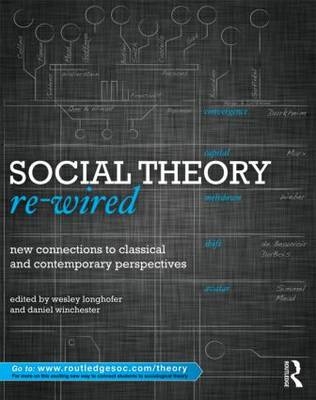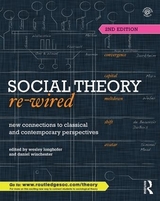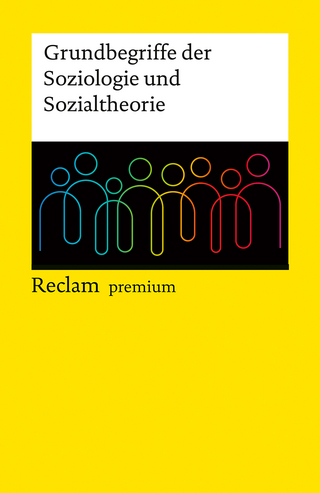
Social Theory Re-Wired
Routledge (Verlag)
978-0-415-88654-3 (ISBN)
- Titel erscheint in neuer Auflage
- Artikel merken
Wesley Longhofer is an assistant professor in the Goizueta Business School at Emory University. He teaches courses in corporate social responsibility and conducts research on philanthropy, globalization, and civic engagement. Daniel Winchester is an assistant professor at the University of Connecticut. His research and teaching interests are in social and cultural theory, religion, morality, and the sociology of the self. Both Wes and Dan were Graduate Editors for Contexts, a publication of the ASA that makes sociology interesting and relevant to a non-academic, public audience. If you have any questions about the book or website, you can reach Dan at http://www.soc.umn.edu/people/gradprofile.php?UID=winch023.
MAIN Table of Contents
Preface
I. EMERGENCE THROUGH CONVERGENCE: The Puzzles of Social Order
Introductory Essay: This Deserted Island is Out of Order
The classic novel The Lord of the Flies helps us see that social order is both a product of our own making and something much more powerful than the sum of its parts. We move from the social facts of Durkheim to more contemporary takes on the enigma of social order.
Classical Connections: Emile Durkheim
1. Emile Durkheim, The Rules of Sociological Method
2. Emile Durkheim, The Division of Labor in Society
3. Emile Durkheim, Suicide
4. Emile Durkheim, Elementary Forms of Religious Life
Contemporary Extensions: Social Order Re-Wired
5. Talcott Parsons and Edward Shils, "Categories of the Orientation and Organization of Action"
6. Harold Garfinkel, Studies in Ethnomethodology
7. Peter Berger and Thomas Luckmann, The Social Construction of Reality
II. NETWORKS OF CAPITAL: Dimensions of Global Capitalism
Introductory Essay: Salvaging What Wall Street Left Behind
Today’s global financial crisis reminds us that economic troubles have profound consequences for social relationships. Marx sets the stage for a lively discussion of the role the economy plays in our global age, and Wallerstein, Castells, and Bourdieu provide contemporary visions of the many links between the economic and the social.
Classical Connections: Karl Marx
8. Karl Marx and Friedrich Engels, The German Ideology
9. Karl Marx and Friedrich Engels, Manifesto of the Communist Party
10. Karl Marx, Capital
11. Karl Marx, "Economic and Philosophic Manuscripts of 1844"
Contemporary Extensions: Capital Re-Wired
12. Immanuel Wallerstein, "The Rise and Future Demise of the World Capitalist System"
13. Manuel Castells, "Materials for an Exploratory Theory of the Network Society"
14. Pierre Bourdieu, "The Forms of Capital"
15. Pierre Bourdieu, Distinction
III. PATHWAY TO MELTDOWN: Theorizing the Dark Side of Modernity
Introductory Essay: Your Smart Phone Might Be an Evil Genius
Smart phones are but one example of how our social world is becoming more and more shaped by technology. From the pious Puritans of Weber to the one-dimensional men of the Frankfurt School, we explore the pitfalls and promises of a rationalized, modern society.
Classical Connections: Max Weber
16. Max Weber, The Protestant Ethic and the Spirit of Capitalism
17. Max Weber, "Basic Sociological Terms"
18. Max Weber, "The Types of Legitimate Domination"
19. Max Weber, "Bureaucracy"
20. Max Weber, "Class, Status, Party"
Contemporary Extensions: The Rational Society Re-Wired
21. Herbert Marcuse, One–Dimensional Man
22. Jurgen Habermas, Toward a Rational Society
23. Michel Foucault, Discipline and Punish
24. Anthony Giddens, The Consequences of Modernity
IV. SHIFTING THE PARADIGM: Excluded Voices, Alternative Knowledges
Introductory Essay: Webs Of Knowledge in the Digital Divide
The production of knowledge on the Internet is not as democratic as we might think. DuBois, Beauvoir, and more contemporary voices within critical race, postcolonial, and feminist thought remind us the same is true in social theory.
Classical Connections: W.E.B. DuBois and Simone de Beauvoir
25. W.E.B. Du Bois, The Souls of Black Folk
26. Simone de Beauvoir, The Second Sex
Contemporary Extensions: Paradigms Re-Wired
27. Michael Omi and Howard Winant, Racial Formation in the United States
28. Frantz Fanon, Black Skin, White Masks
29. Edward Said, Orientalism
30. Dorothy Smith, The Conceptual Practices of Power
31. Patricia Hill Collins, Black Feminist Thought
V. RISE OF THE AVATAR: Connecting Self and Society
Introductory Essay: Through the Looking-Glass of Facebook
Our Facebook profiles provide a glimpse of the collective foundations of our individual selves. Mead and Simmel lay the foundations for thinking about the social origins of the self, and Goffman, Foucault, and others provide provocative takes on what identity means in today’s complicated world.
Classical Connections: George Herbert Mead and Georg Simmel
32. George Herbert Mead, "Self"
33. Georg Simmel, "The Metropolis and Mental Life"
34. Georg Simmel, "The Stranger"
Contemporary Extensions: Identity Re-Wired
35. Erving Goffman, The Presentation of Self in Everyday Life
36. Michel Foucault, The History of Sexuality
37. Judith Butler, Gender Trouble
38. Zygmunt Bauman, "From Pilgrim to Tourist: or a Short History of Identity"
Glossary Index
ALTERNATE Table of Contents (BY TRADITION OR THEORIST)
Preface
I. Classical Sociological Theory
1. KARL MARX
8. Karl Marx and Friedrich Engels, The German Ideology
9. Karl Marx and Friedrich Engels, Manifesto of the Communist Party
10. Karl Marx, Capital
11. Karl Marx, "Economic and Philosophic Manuscripts of 1844"
2. EMILE DURKHEIM
1. Emile Durkheim, The Division of Labor in Society
2. Emile Durkheim, The Rules of Sociological Method
3. Emile Durkheim, Suicide
4. Emile Durkheim, Elementary Forms of Religious Life
3. MAX WEBER
16. Max Weber, The Protestant Ethic and the Spirit of Capitalism
17. Max Weber, "Basic Sociological Terms"
18. Max Weber, "The Types of Legitimate Domination"
19. Max Weber, "Bureaucracy"
20. Max Weber, "Class, Status, Party"
4. GEORG SIMMEL
33. Georg Simmel, "The Metropolis and Mental Life"
34. Georg Simmel, "The Stranger"
5. DU BOIS AND DE BEAUVOIR
25. W.E.B. Du Bois, The Souls of Black Folk
26. Simone de Beauvoir, The Second Sex
II. Mid–Century American Sociology
6. PRAGMATISM
32. George Herbert Mead, "Self"
7. STRUCTURAL FUNCTIONALISM
5. Talcott Parsons and Edward Shils, "Categories of the Orientation and Organization of Action"
8. PHENOMENOLOGY
7. Peter Berger and Thomas Luckmann, The Social Construction of Reality
9. SYMBOLIC INTERACTIONISM
35. Erving Goffman, The Presentation of Self in Everyday Life
10. ETHNOMETHODOLOGY
6. Harold Garfinkel, Studies in Ethnomethodology
III. Recent Developments
11. CRITICAL THEORY
21. Herbert Marcuse, One–Dimensional Man
22. Jurgen Habermas, Toward a Rational Society
12. POSTSTRUCTURALISMS
23. Michel Foucault, Discipline and Punish
36. Michel Foucault, The History of Sexuality
14. Pierre Bourdieu, "The Forms of Capital"
15. Pierre Bourdieu, Distinction
13. CONTEMPORARY FEMINIST THEORY
30. Dorothy Smith, The Conceptual Practices of Power
31. Patricia Hill Collins, Black Feminist Thought
37. Judith Butler, Gender Trouble
14. RACE, ETHNICITY, AND POSTCOLONIALISM
28. Frantz Fanon, Black Skin, White Masks
29. Edward Said, Orientalism
27. Michael Omi and Howard Winant, Racial Formation in the United States
15. MODERNITY AND POSTMODERNITY
12. Immanuel Wallerstein, "The Rise and Future Demise of the World Capitalist System"
13. Manuel Castells, "Materials for an Exploratory Theory of the Network Society"
24. Anthony Giddens, The Consequences of Modernity
38. Zygmunt Bauman, "From Pilgrim to Tourist: or a Short History of Identity"
Glossary Index
| Erscheint lt. Verlag | 1.3.2012 |
|---|---|
| Reihe/Serie | Sociology Re-Wired |
| Zusatzinfo | Adaptn of Social Work series; 2 Tables, black and white |
| Verlagsort | London |
| Sprache | englisch |
| Maße | 187 x 235 mm |
| Gewicht | 1157 g |
| Themenwelt | Literatur ► Biografien / Erfahrungsberichte |
| Sozialwissenschaften ► Soziologie ► Allgemeines / Lexika | |
| ISBN-10 | 0-415-88654-6 / 0415886546 |
| ISBN-13 | 978-0-415-88654-3 / 9780415886543 |
| Zustand | Neuware |
| Haben Sie eine Frage zum Produkt? |
aus dem Bereich



